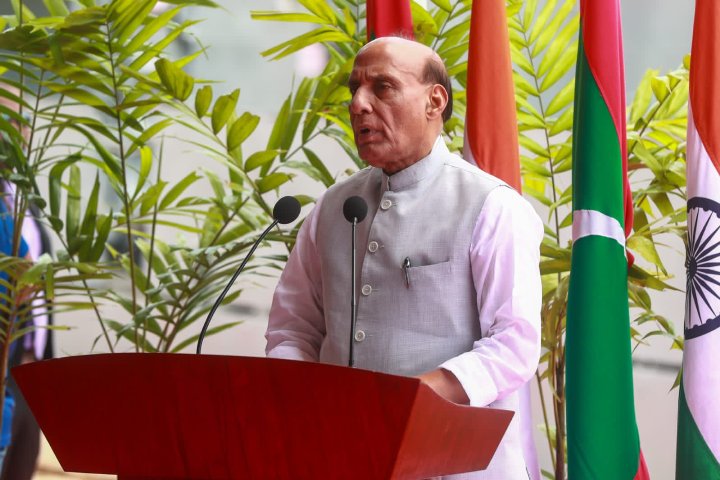Rajnath Singh Calls for Global Unity Against Terrorism; Hails Operation Sindoor
Rajnath Singh’s speech was a bold and multifaceted message—directed at Pakistan, the international community, Indian citizens, and the media.

- Country:
- India
Addressing a landmark dialogue on ‘National Security & Terrorism’ in Dehradun on June 10, 2025, Raksha Mantri Shri Rajnath Singh declared Operation Sindoor as the biggest anti-terror response in India’s history. The event highlighted the transformation of India’s security doctrine over the last 11 years under Prime Minister Narendra Modi’s leadership.
Rajnath Singh’s speech was a bold and multifaceted message—directed at Pakistan, the international community, Indian citizens, and the media. At the heart of his message was the demand for collective responsibility in fighting terrorism—not just through military action, but also through public awareness, information integrity, and global diplomatic measures.
Operation Sindoor: A Strategic and Symbolic Shift
Operation Sindoor was launched in retaliation for the brutal terror attack on civilians in Pahalgam, Jammu & Kashmir. Singh asserted the operation marked a tectonic shift in India’s posture—from reactive to preemptive. He described it as a message not only to terrorists but also to states that sponsor them: “We destroyed terror bases and infrastructure in Pakistan and PoK,” he declared.
He emphasized that the attack in Pahalgam was aimed at India’s social unity, but instead, it galvanized the nation into a powerful counteroffensive.
Aftermath of Article 370: Development as the New Weapon
Singh linked the escalation in terrorism to India’s decisive step of abrogating Article 370, which ended Jammu & Kashmir’s special status. Since then, he noted, the region has entered an “era of peace and progress”—a trajectory that Pakistan allegedly cannot tolerate.
He cited infrastructure milestones such as the Udhampur-Srinagar-Baramulla railway link as symbols of India’s development-centric approach to national security. Singh predicted that one day PoK would reunite with India, proclaiming, “PoK will soon say ‘I, too, am Bharat’.”
The Broader Threat: Terrorism as a Global Epidemic
Singh did not limit his remarks to South Asia. He issued a passionate call for a global eradication of terrorism, denouncing it as a “distorted moral reasoning” and “the biggest curse on humanity.” He stressed that terrorism impedes democracy, development, and coexistence worldwide.
“Terrorism must not be allowed to die a natural death—it must be eradicated.” He appealed to global institutions like the United Nations to take more concrete steps.
Criticism of Pakistan and the UN: A Diplomatic Challenge
In a scathing rebuke, Singh labeled Pakistan as the "Father of Global Terrorism", contrasting it with India’s standing as the “Mother of Democracy.” He condemned Pakistan’s consistent sheltering and support of terrorists like Hafiz Saeed and Masood Azhar, and highlighted the Pakistan Army’s association with terrorist funerals as a shocking example of state complicity.
He expressed disbelief over the UN Security Council appointing Pakistan as Vice-Chair of the Counter-Terrorism Panel, a country he accused of harboring the 9/11 mastermind. This, he said, questions the very intent of the global counter-terrorism framework.
Defence Self-Reliance: A Pillar of National Strength
Rajnath Singh pointed to the Aatmanirbhar Bharat (self-reliant India) campaign as crucial in building a resilient defence ecosystem. He cited that during Operation Sindoor, all weapons and platforms used were Made in India, including missiles like Agni, Prithvi, and BrahMos, and even aircraft carriers such as INS Vikrant.
He noted the defence budget leap from ₹2.53 lakh crore in 2013-14 to ₹6.22 lakh crore in 2024-25, and the launch of 10 Positive Indigenisation Lists with over 5,500 items. India's defence production has surged from ₹40,000 crore in 2014 to over ₹1.3 lakh crore today, and defence exports have grown from ₹686 crore to ₹23,622 crore, targeting ₹50,000 crore by 2029.
Cyber and Information Warfare: The New Battlefield
Singh warned of a digital dimension to modern warfare, emphasizing the role of citizens as “social soldiers.” He urged them to fight disinformation, especially fake news and propaganda used by adversaries to demoralize the public and security forces, as seen during Operation Sindoor.
He added, “Sharing false information makes one an unwitting weapon in the enemy’s hands.” The government is bolstering cybersecurity, but citizen vigilance is now the first line of defence.
Role of the Media: ‘Correctness Over Virality’
He called on the media to prioritize accuracy over speed, lamenting the current trend where “being viral” takes precedence over “being verified.” He described journalism as a national duty, urging media professionals to uphold truth and responsibility, especially in national security matters.
Global Call to Action and a Message to Pakistan
Singh invited the global community to isolate Pakistan diplomatically and economically, specifically cutting foreign funding that is diverted to terrorist infrastructure. He even offered India’s assistance if Pakistan is incapable of rooting out terror on its own, reinforcing India's readiness to take cross-border action when needed.
He said, “If Pakistan cannot eliminate terrorists, India will help. But the world must act too.”
A Vision for Peace, Through Strength
Shri Rajnath Singh’s address was a clarion call for resilience, vigilance, and unity—not only for India but for the entire global community. He envisioned a world where terrorism is not just contained but completely eliminated, and where national security includes strategic autonomy, social integrity, and digital responsibility.
His message was clear: India will protect its people, its values, and its future—on every front, by every means necessary.
- READ MORE ON:
- national security
- Operation Sindoor
- Rajnath Singh
- terrorism
- Pahalgam attack
- Article 370
- Pakistan
- UN Security Council
- Aatmanirbhar Bharat
- defence exports
- cyber warfare
- Indian Armed Forces
- PoK
- Kashmir development
- global terrorism
- Indian defence budget
- information warfare
- media responsibility










